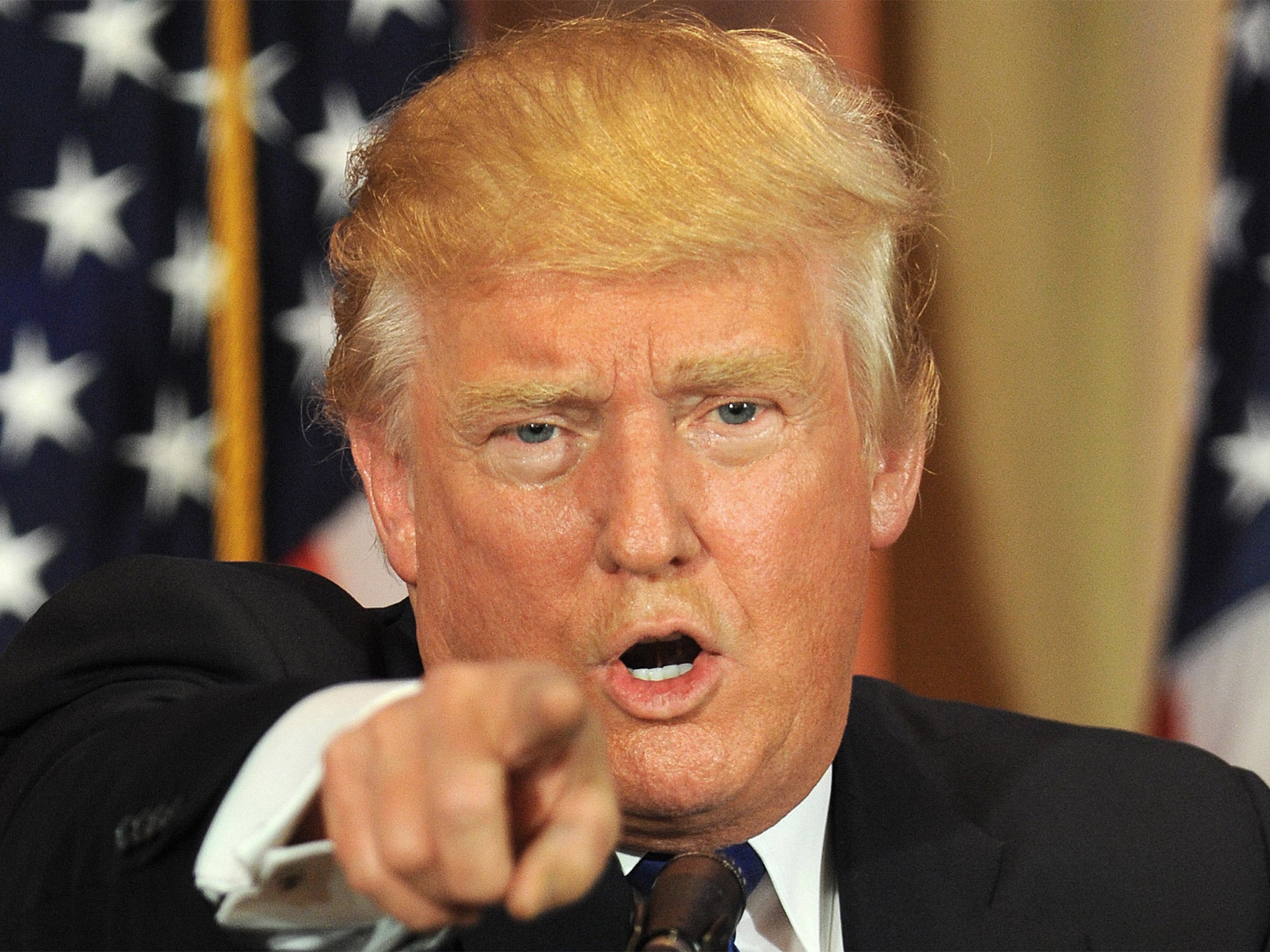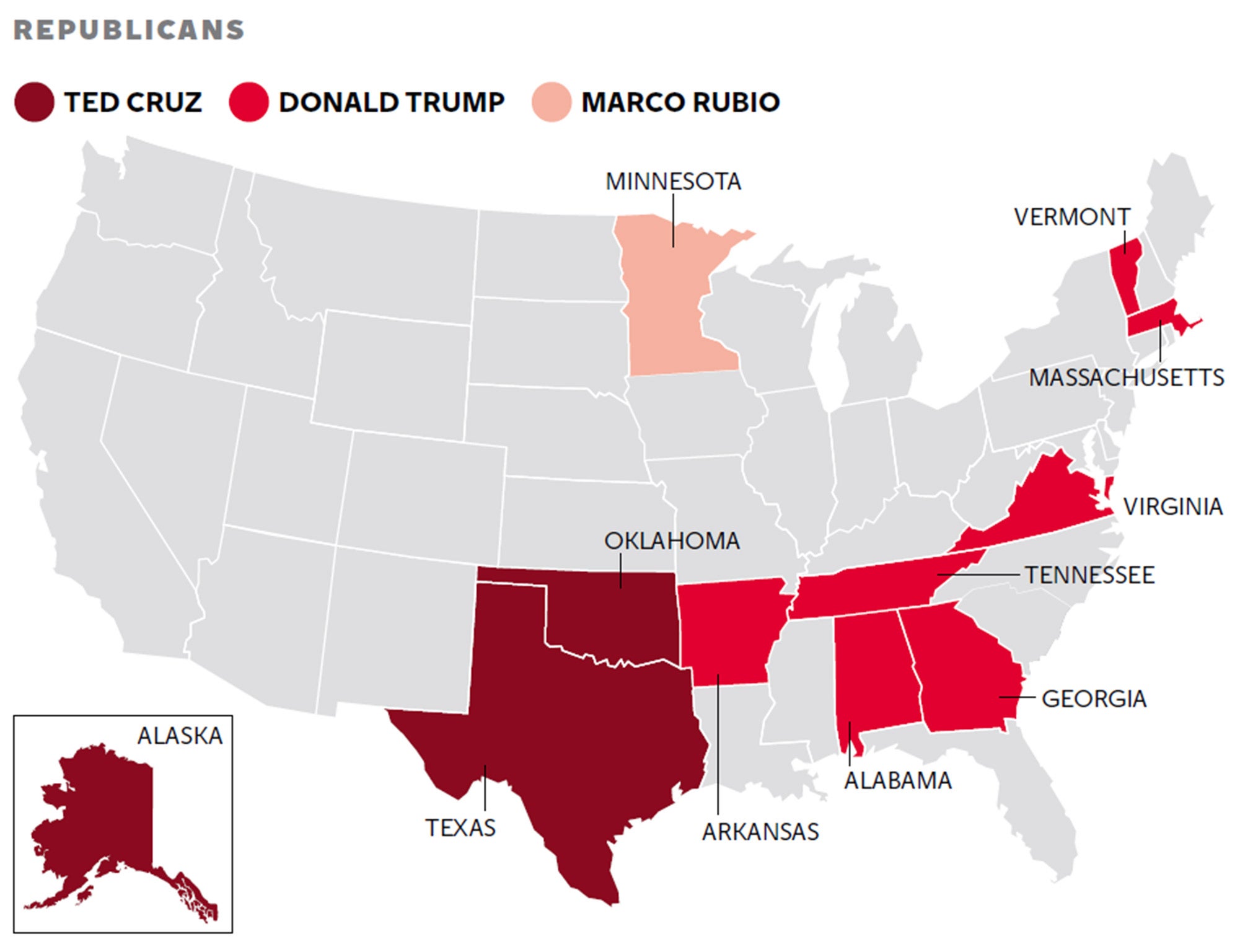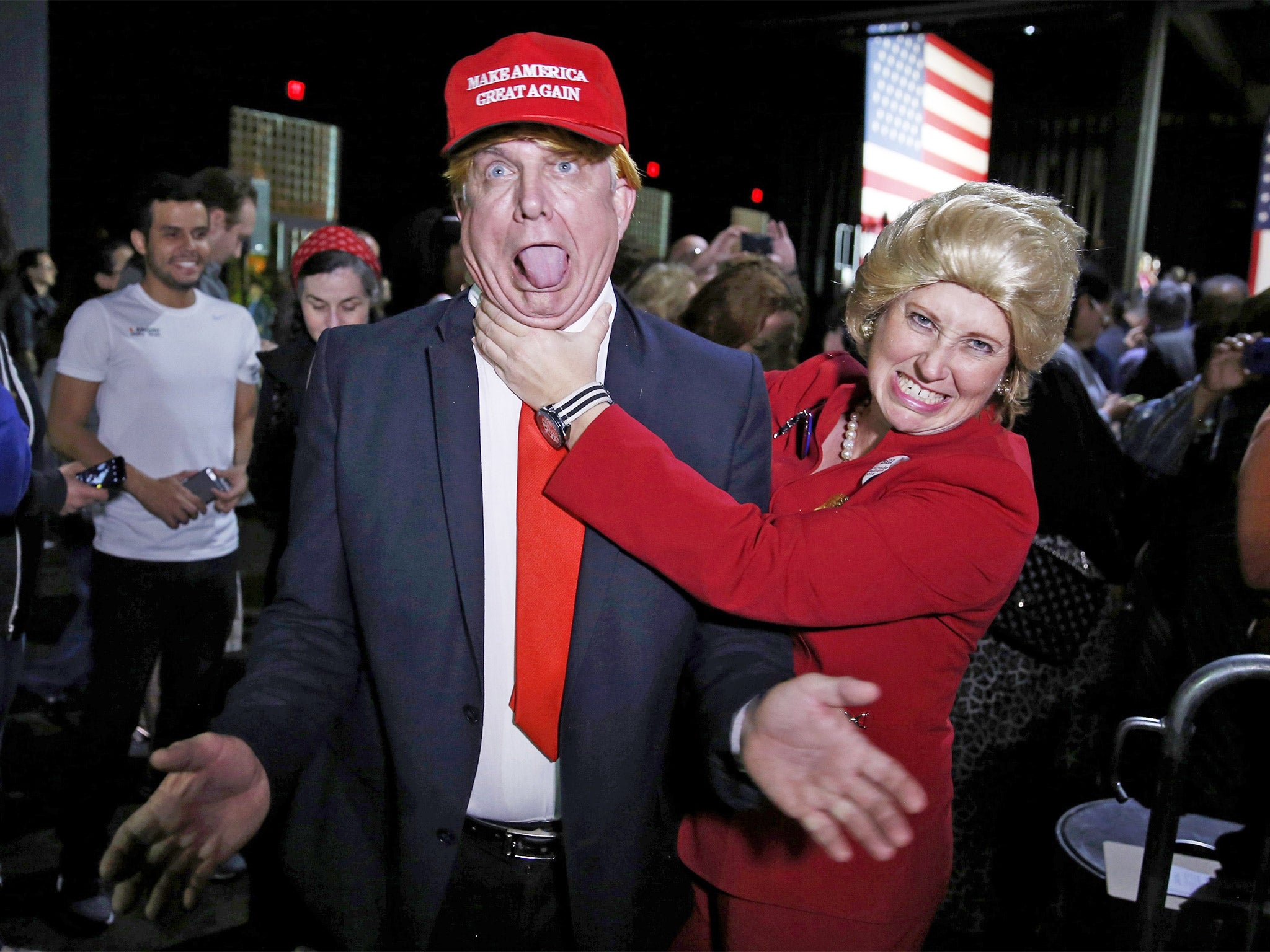Donald Trump faces the toughest enemy yet after Super Tuesday victory: his party’s furious establishment
Super Tuesday results mean a Donald Trump presidency is suddenly a serious prospect

Super Tuesday is history, and three things about the race to become America’s next President are now clear.
Barring indictment over her private email server, Hillary Clinton will be the Democratic nominee. Barring that semi-mythical creature, an open convention, Donald Trump will be the Republican nominee. Third, his hostile takeover of the party is generating a split that threatens its very existence.
On the biggest single night of the primary season, Ms Clinton and Mr Trump each carried seven states. Vermont senator Bernie Sanders vows to carry on, but his populist challenge to the former First Lady is fading, and he faces nigh impossible delegate arithmetic.
As for the real-estate billionaire, a fractured opposition merely plays into his hands. Ted Cruz, fresh from winning three states on 2 March, is now his most plausible rival – but Marco Rubio and John Kasich refuse to drop out, though also-ran Ben Carson last night indicated he would end his campaign. For Mr Trump, it is a case of divide and rule.
Indeed, his fight now is less against his individual opponents than the Republican Party “establishment”, that amalgam of party elders and Congressional grandees, governors, big donors and old-school conservative media such as The Wall Street Journal. Had any of his rivals swept 10 of the first 15 states to vote, from Alabama and Georgia in the media such as The Wall Street Journal. Had any of his rivals swept 10 of the first 15 states to vote, from Alabama and Georgia in the Deep South to venerable and Yankee Massachusetts, that would have been that. Republicans would this morning be joyfully closing ranks around the victor and excoriating Ms Clinton. Not so, however, in this season of Donald Trump.

Despite a few defectors, most notably New Jersey Governor Chris Christie, most of the establishment cannot stand him – nor Mr Cruz for that matter. As Lindsey Graham, respected Republican senator and former candidate put it, Mr Trump and Mr Cruz offer a choice of being poisoned or being shot.
The next fortnight offers his foes a final chance of thwarting Mr Trump. Over the next nine days, there will be Republican primaries and caucuses in 10 states. The real crunch comes however on 15 March when Illinois, Ohio, Florida and North Carolina hold their primaries.
Two of them, Florida and Ohio, home states and last redoubts of Mr Rubio and Mr Kasich respectively, are winner take all. At this point it will be clear whether the property mogul can be denied an overall majority of delegates at the Cleveland convention in July. If Mr Trump wins either, let alone both, it is over. And so to Trump versus Clinton, pitting the ultimate outsider against the ultimate insider, a man who has never held elective office against the best qualified presidential candidate in a generation.

On paper – and this is precisely the fear of the shellshocked Republican elite – it should be no contest. Mr Trump will go down to a defeat to rival that of Barry Goldwater in 1964, when an earlier party split sealed the ascendency of conservatives over a moderate and East Coast Republican establishment, embodied by Nelson Rockefeller. Such a disaster, it is argued, would in turn cost Republicans their current control of the Senate, and seriously dent their massive majority in the House of Representatives. President Hillary Clinton would be free to construct a liberal majority on the Supreme Court, the ever more influential third branch of government, that would last a generation.
Not so fast. A match-up with Mr Trump would be no sure thing, despite polls that mostly show Ms Clinton a clear winner. For one thing, in a politically polarised country election landslides such as 1964, or Ronald Reagan’s routs of Jimmy Carter and Walter Mondale in the 1980s, do not happen any more.

True, Mr Trump’s negative ratings exceed even those of the battle-scarred former Secretary of State and First Lady, untrusted, polls suggest, by 55 per cent of the population. Such is the downside of “Clintonism”. But it will be a dirty fight – as a former top Obama adviser put it, less a case of “hope and change” than “hate and castrate”. As the Republican campaign thus far as shown, when it comes to down and dirty, Donald Trump is without peer.
And on one point, that establishment turncoat Chris Christie is right. Mr Trump is not so much a party as a movement. Every excess, it seems, only bolsters his popularity, and draws more followers. Super Tuesday proved this. Turnout in the Republican primaries broke records. People who never voted before are now doing so. And many of these voters are blue-collar Democrats, as angry at the failure of America’s political system to tackle the country’s problems as their Republican counterparts. Mr Trump may be alienating the establishment – but that establishment has now lost control of the base.

For all his railings, he is no conservative. In the past Trump has, among other things, supported a single-payer healthcare system, expressed support for abortion rights, and taken a relatively neutral line in the Israeli-Palestinian dispute.
In the Trump phenomenon there are shades of the “Reagan Democrats” of the 1980s. For every Republican who would vote Hillary rather than stomach Mr Trump, there is probably a Democratic voter ready to move in the opposite direction. It will not be easy for Ms Clinton. But the biggest loser on Super Tuesday may not have been Mr Sanders, Mr Rubio or Mr Kasich, but the Republican party itself.
There have been rifts in the past – the Goldwater schism of the 1960s, and half a century earlier Teddy Roosevelt’s breakaway third-party campaign – but this time feels different. Never has the gulf between a party elite and that party’s grass roots been greater. And for its predicament the Republican establishment has only itself to blame. With its relentless obstructionism and refusal to compromise, it bears the main responsibility for the shambles in Washington that fuels Mr Trump’s ascent.
Having sown the wind, it is now reaping the whirlwind. Like an old, out-of-touch corporate board desperately trying to come to grips with a hostile takeover, they must now cope with Donald Trump.
Join our commenting forum
Join thought-provoking conversations, follow other Independent readers and see their replies
Comments
Bookmark popover
Removed from bookmarks